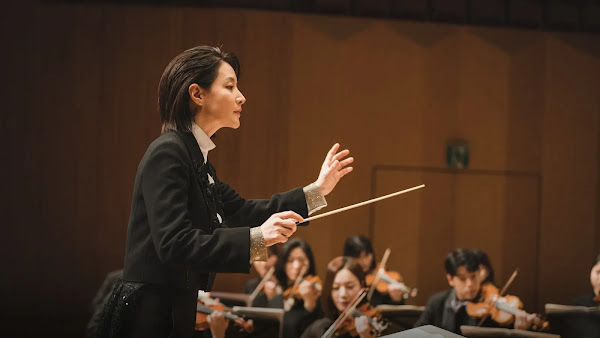Search This Blog

Welcome to my blog, where we explore the rich tapestry of Korean content on OTT—from deeply moving dramas to captivating films—all while diving into the broader landscape of Korean culture. Whether you’re a seasoned K-drama fan or a newcomer eager to discover the cinematic gems, this is your space to find heartfelt reviews, thoughtful insights. Get ready to embark on a journey that celebrates the stories, characters, and traditions that make Korean entertainment so universally compelling!
Featured
Explore 'Maestra: Strings of Truth,' a suspenseful Korean drama on Disney+ following a brilliant female conductor unraveling secrets within her orchestra and herself.
Maestra: Strings of Truth – A Bold and Elegant Korean Mystery
Introduction
“Maestra: Strings of Truth” is not your typical classical music drama—it’s a taut, elegant thriller wrapped in the world of orchestral performance. Featuring a fiercely intelligent female lead and a labyrinth of secrets among musicians, the series brings suspense, betrayal, and personal reckoning to the stage. As each note is played, hidden tensions rise, revealing a complex story of control, truth, and survival in an environment where perfection is demanded and truth is concealed. Stylish and cerebral, it's a drama that strikes more than just musical chords.
Overview
Title: Maestra: Strings of Truth (마에스트라)
Year: 2023
Genre: Mystery, Thriller, Psychological Drama
Main Cast: Lee Young-ae, Lee Moo-saeng, Kim Young-jae, Hwang Bo-reum-byeol
Episodes: 12
Runtime: Approximately 60 minutes per episode
Director: Kim Jung-kwon
Writer: Choi Yi-yoon
Original Network: tvN
Streaming Platform: Disney+
Overall Story (No Major Spoilers)
Cha Se-eum (Lee Young-ae) is a world-renowned conductor who returns to South Korea to lead the struggling Han River Philharmonic Orchestra. Sophisticated, commanding, and razor-sharp, she immediately asserts control over her new ensemble. But beneath her graceful baton lies a buried truth—Se-eum is fighting against her own unraveling past, and the orchestra becomes a stage for far more than music.
Each rehearsal exposes more than musical flaws. There are whisperings of sabotage, mysterious accidents among the musicians, and a suffocating atmosphere of competition and paranoia. Se-eum must confront not only the chaos within her orchestra but also the secrets surrounding her sudden return. As tensions rise, the question shifts from “Can she save the orchestra?” to “Can she save herself?”
Her relationship with her husband, Kim Pil (Kim Young-jae), a powerful businessman, is strained and cold—built on strategic appearances rather than warmth. Their marriage becomes another arena of performance, one where trust is brittle and motives are never pure. Meanwhile, Yoo Jung-jae (Lee Moo-saeng), an old flame and cellist, reappears, complicating Se-eum’s emotional balance just as she needs to remain most composed.
Amid mounting pressure, the orchestra’s younger talents—including Lee Ru-na (Hwang Bo-reum-byeol), an ambitious violinist with secrets of her own—push against Se-eum’s authority. Ru-na’s defiance becomes a mirror to Se-eum’s past self, raising questions about legacy, sacrifice, and what it means to lead women in male-dominated spaces.
Se-eum is a protagonist unlike most. She doesn’t plead for sympathy. She calculates, commands, and conceals—but beneath her steely poise is a woman terrified of losing control over her body, her legacy, and her truth. As her health falters and paranoia grows, even she can’t distinguish between reality and obsession. The result is a psychological slow burn where the stakes are life, death, and the silence between two notes.
Visually, the series is stunning—lavish concert halls, sharply lit practice rooms, and moody color palettes create an atmosphere of elegance laced with dread. Every performance scene crackles with unspoken tension, and each character feels like they’re hiding something behind their score. With music as metaphor, Maestra: Strings of Truth plays a slow, suspenseful symphony you won’t soon forget.
Highlight Moments / Key Episodes
- Episode 1: Cha Se-eum’s striking first rehearsal where she humiliates the concertmaster and asserts total control over the orchestra sets the tone for the entire series.
- Episode 2: A musician collapses mysteriously during practice, sparking rumors that sabotage is occurring from within.
- Episode 4: Se-eum receives anonymous sheet music with a threatening message written in the margins—someone knows her secret.
- Episode 6: A quiet scene between Se-eum and her old flame Yoo Jung-jae reveals deep regret and unresolved desire—without a word of romance spoken.
- Episode 8: Lee Ru-na performs a solo with such intensity that it nearly outshines Se-eum’s authority, raising new questions of succession and rebellion.
- Episode 10: Se-eum conducts while battling a hidden physical ailment—her vision blurs, but the music never falters. It’s a masterclass in performance under pressure.
Memorable Lines
- Episode 1: “An orchestra is not a democracy. It obeys the baton—or it breaks.”
— Se-eum silences an insubordinate musician with this chilling truth. - Episode 2: “Everyone wears black for a concert. It helps hide the blood.”
— A cryptic comment left by an anonymous orchestra member in a note. - Episode 4: “Music is honesty. That’s why it terrifies people like us.”
— Se-eum to Jung-jae during a late-night conversation in the rehearsal hall. - Episode 6: “If I disappear tomorrow, no one will remember what I said. But they’ll remember how I sounded.”
— Se-eum reflecting on mortality and legacy. - Episode 10: “Silence is not absence. It’s suspense.”
— A line Se-eum whispers to herself before raising the baton in the most pivotal concert of the series.
Why It’s Special
1. A Rare Female Conductor Lead: “Maestra: Strings of Truth” centers around a fiercely intelligent and commanding female conductor—something nearly unheard of even in real-world orchestras. This alone makes it a standout in both representation and narrative perspective.
2. Lee Young-ae’s Captivating Return: Lee Young-ae, beloved for her iconic roles in “Dae Jang Geum” and “Bring Me Home,” returns to television after years with a performance full of poise, precision, and inner torment. Her portrayal is chilling yet vulnerable, bringing the complex Se-eum to unforgettable life.
3. Orchestral Drama as Metaphor: The competitive, hierarchical, and emotionally charged atmosphere of the orchestra becomes a perfect metaphor for power, ambition, and the cost of perfection. It’s an underused but visually rich setting for a mystery-thriller.
4. Visually and Aurally Striking: From candle-lit practice rooms to stunning concert halls, the cinematography balances elegance with tension. The classical music score isn’t just background—it heightens emotion and doubles as narrative force.
5. Complex Female Rivalries: The dynamic between Se-eum and younger violinist Lee Ru-na isn’t just about talent, but legacy, mentorship, and defiance. It’s a refreshing take on intergenerational conflict without reducing either woman to clichés.
6. Twists Rooted in Psychology: Unlike many thrillers that depend on external plot shocks, this drama’s suspense comes from within—trauma, memory, and suppressed truth. Se-eum’s deteriorating grasp on reality is as terrifying as any villain.
7. Music as a Weapon and Healer: The drama doesn’t romanticize music—it explores how it can be both destructive and redemptive. Performances often blur with emotional collapse, making each concert a moment of life or death.
8. Inspired by French Original: The show is based on the French series "Philharmonia," but localizes its themes with Korean sensibility and elegance, making it feel both fresh and culturally rooted.
Popularity & Reception
“Maestra: Strings of Truth” premiered to high anticipation due to Lee Young-ae’s return, and quickly earned a loyal viewership. While not a mainstream juggernaut, it gained steady traction among fans of psychological thrillers and feminist narratives. Critics praised its artistic visual composition, restrained script, and bold portrayal of a deeply flawed but fascinating female lead.
International viewers on Disney+ noted the show’s elegance and slow-burn pacing as distinct strengths. On Reddit, discussions often centered around how rare it was to see orchestral settings in dramas, with many users comparing it to the intense psychological thrillers of the BBC. YouTube clips of Se-eum’s rehearsals garnered thousands of views, with comments admiring her cold charisma and layered delivery.
Domestically, the drama sparked conversation about gender roles in leadership, particularly in the arts. Music forums and blogs lit up with discussions about the accuracy of orchestral hierarchy, and some conductors even responded, noting how Se-eum's character reflected real pressures they face.
While the show did not top ratings charts, its consistent tone, thematic ambition, and lead performance earned it cult acclaim. Its finale was met with both admiration and analysis, as viewers debated the ambiguity of Se-eum’s fate—leaving just enough mystery to echo long after the music stopped.
Cast & Fun Facts
Lee Young-ae (Cha Se-eum): Lee Young-ae’s performance as Cha Se-eum marks her first return to television since “Inspector Koo” and her globally acclaimed film “Bring Me Home.” Known best for “Dae Jang Geum (Jewel in the Palace),” she brings her signature composure and mystery to the role. For “Maestra,” she worked closely with real conductors to mimic baton technique and hand gestures, training for months to convincingly lead an orchestra onscreen.
Critics praised Lee for portraying a character who is at once strong, cold, and frighteningly relatable. Audiences especially noted her emotional restraint—Se-eum rarely cries, but her silence roars. Fans pointed out the duality in Lee’s posture: rigid in public, collapsed in private. Her performance is frequently mentioned in lists of best K-drama female leads of 2023.
Lee Moo-saeng (Yoo Jung-jae): Lee Moo-saeng brings both warmth and suspicion to the role of Jung-jae, a cellist and Se-eum’s enigmatic former lover. Known for his roles in “The World of the Married” and “Thirty-Nine,” Lee continues his streak of nuanced, emotionally intelligent characters. His chemistry with Lee Young-ae is restrained but electrifying, especially in their rehearsal scenes which often speak louder than their dialogues.
Lee prepared by studying cello positioning and collaborating with real musicians for realism. In interviews, he described the challenge of playing a character who says little but communicates volumes through gaze and pause. His quiet strength acts as a perfect counterpoint to Se-eum’s unraveling control.
Kim Young-jae (Kim Pil): As Se-eum’s husband, Kim Pil, Kim Young-jae plays a man whose business acumen hides a deeper agenda. Known for supporting roles in “Private Lives” and “Hyena,” Kim steps into a colder, more manipulative role here. Fans noted the chilling shift in his character’s tone between public and private scenes—particularly how he uses charm as a form of control.
Behind the scenes, Kim worked with the writers to clarify subtle power shifts in dialogue. His character’s minimal lines are intentional, forcing viewers to interpret power through posture, tone, and tension. His final scenes with Se-eum remain some of the most debated moments in the series.
Hwang Bo-reum-byeol (Lee Ru-na): Rising star Hwang Bo-reum-byeol delivers a standout performance as Lee Ru-na, a brilliant but rebellious violinist. Viewers may recognize her from “The World of My 17” or “The King’s Affection.” Here, she portrays a young woman challenging tradition, authority, and her own limits.
Hwang studied violin technique for weeks, and her live rehearsal scenes were praised for their authenticity. Critics noted that her character provided a fresh generational voice in a story dominated by legacy and tradition. Her confrontations with Se-eum show not just talent but emotional courage.
Director Kim Jung-kwon & Writer Choi Yi-yoon: Director Kim Jung-kwon, known for “Lie After Lie,” lends the series a poetic, deliberate pace. Each shot is composed like a musical phrase, with framing echoing rhythm and silence. Writer Choi Yi-yoon brings a sharp edge to the dialogue, using music metaphors to dissect psychological pain. The duo worked closely to ensure each episode built toward a crescendo of emotion and truth.
One particularly praised choice was the subtle use of color palettes—cool blues in moments of tension, deep reds for revelation. Many episodes have hidden visual symbols (like cracked mirrors, tuning forks, and echo chambers) that reward close rewatching. These artistic decisions made the series a favorite among drama reviewers who value visual storytelling.
Related Posts
Hashtags
#MaestraStringsOfTruth #KoreanDrama #LeeYoungAe #MysteryThriller #DisneyPlusKDrama #KDramaRecommendations #PsychologicalDrama #FemaleLeadDrama #HiddenGems #KDrama2023
- Get link
- X
- Other Apps
Popular Posts
Dive into 'Rookie Historian Goo Hae-Ryung', a heartwarming Korean drama where a fearless woman fights to write her own story during the Joseon Dynasty.
- Get link
- X
- Other Apps
Miracle in Cell No. 7 (2013): a tender Korean dramedy about a jailed father and the daughter who won’t give up. Warm, funny, heartbreaking—and worth your night.
- Get link
- X
- Other Apps
Dive into 'Inspector Koo,' a thrilling Korean drama on Netflix where a quirky former cop takes on a serial killer in a deadly cat-and-mouse game.
- Get link
- X
- Other Apps
“Bulgasal: Immortal Souls” merges ancient curses, reincarnation romance, and modern dread in a K-Drama exploring vengeance and redemption over centuries – on Netflix.
- Get link
- X
- Other Apps
'The Good Detective,' a gripping Korean crime drama where two detectives with contrasting styles uncover buried truths.
- Get link
- X
- Other Apps
'Stranger', a critically acclaimed Korean crime drama where a stoic prosecutor and a compassionate detective uncover layers of corruption. Streaming on Netflix.
- Get link
- X
- Other Apps
“Misty” is a gripping K-Drama on Netflix blending high-stakes journalism, tangled romance, and electrifying suspense that keeps viewers on the edge of their seats.
- Get link
- X
- Other Apps
'Hometown' is a chilling Korean drama that blends psychological thriller and political mystery, set against the eerie backdrop of a small town hiding deadly secrets.
- Get link
- X
- Other Apps
“Doctor Stranger” is a sweeping Korean drama mixing heart surgery, political tension, and heartbreaking romance—with Lee Jong-suk at the emotional core.
- Get link
- X
- Other Apps
Step back in time with “Moon Lovers: Scarlet Heart Ryeo,” a sweeping Korean historical romance on Netflix brimming with regal intrigue, destiny, and star-crossed love
- Get link
- X
- Other Apps













Comments
Post a Comment